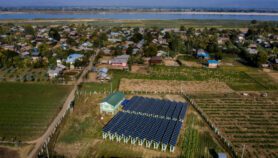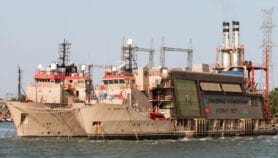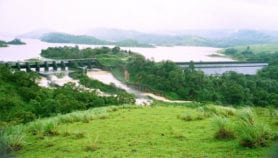Send to a friend
The details you provide on this page will not be used to send unsolicited email, and will not be sold to a 3rd party. See privacy policy.
Any effort to eliminate Iran’s nuclear research facilities by force would be both a catastrophe for the region and a major setback for the ‘science for development’ debate.
In December 1953, US president Dwight Eisenhower delivered a landmark speech at the United Nations, in which he offered to share the West’s nuclear science and technology with the rest of the world provided it could be done in a way that guaranteed it be used for peaceful purposes only.
Eisenhower suggested that this goal of ‘Atoms for Peace’ could best be achieved by setting up an international regulatory body with a development mission, a proposal that led to the creation of the International Atomic Energy Agency four years later.
Since then, the agency has done much to meet this mandate (see ‘Not just weapons: nuclear science for development’). But Iran’s announcement last week that it had successfully developed nuclear enrichment technology shows that international consensus on handling nuclear science is still as elusive as ever.
One reaction, voiced most strongly in Washington, has been another round of sabre rattling. The Iranian announcement coincided with reports in the US press that the Bush administration is drawing up provisional plans for a military strike to "take out" Iran’s enrichment research facilities, in the belief that this would stop the programme in its tracks. The reports stated that some US commanders are even contemplating using nuclear weapons to achieve this goal.
Such an approach would be as politically catastrophic as it would be ineffective. One of the many uncomfortable lessons from the US-led invasion of Iraq is that technological superiority is not a long-term solution to deep-rooted political problems. Indeed, if insensitively applied, a show of technological strength can only make problems worse.
A military strike could well create a temporary setback for Iran’s nuclear ambitions. But its more long-lasting effect would be to feed political resentment against the West and its technology across the region, if not much of the developing world.
Even the Russian foreign minister Sergai Lavrov, who shares the concern of Europe and the United States about the implications of the Iranian developments, warned last week that military intervention could result in an "explosive blast" in the Middle East.
Alternative solutions
Economic sanctions are an equally unacceptable scenario. Again, the experience with Iraq over the past 15 years have provided a valuable lesson in international diplomacy — namely that when sanctions are applied, it is often the poor who suffer most.
And where sanctions are seen as the price of standing up to the West — or at least are presented as such by political leaders — they can backfire by hardening, rather than undermining, national support for a regime, however unpopular it may be with other countries.
There is only one acceptable solution: to continue to explore every possible avenue for a negotiated settlement. There is still time to achieve this.
Undoubtedly, Iran has mastered nuclear enrichment technology, but it is still several years away from being able to use the technology to produce weapons-grade uranium. Last week’s announcement claimed success in reaching 3.5 per cent enrichment, but this is relatively low compared to the 93 per cent needed to make a nuclear weapon.
Furthermore, media reports suggest that, having made a political point about being able to master nuclear enrichment — a necessary step for producing both bombs and nuclear power stations — Iran might be persuaded to rein in its independent nuclear ambitions, provided that suitable political and economic inducements are offered.
This is the strategy Russia has been following, by offering to carry out uranium enrichment on Iran’s behalf. Although the initial invitation was rebuffed, it still lies on the table, and provides a potential dignity-saving formula: Iran could accept it without appearing to back down from its claims to technological prowess.
Support from scientists
The IAEA, under the leadership of its director general Mohamed ElBaradei, is working overtime to explore the possibilities of a peaceful settlement, and is due to report its progress to the United Nations next week. ElBaradei is rightly insisting that Iran take ‘confidence-building measures’ to meet international criticism. These include suspending uranium enrichment activities, and clarifying that its nuclear programme is solely for civilian uses.
In all these efforts, the IAEA deserves the full support of the international scientific community. It was, after all, scientists who created the nuclear ‘genie’ and — backed by the military — let it out of the bottle. And over the past 50 years, the scientific community has been leading efforts to ensure that nuclear technology is used responsibly — a need that remains a strong as ever.
Ironically however, one of the key messages scientists should convey to political leaders is that although science, and the technology based on it, are necessary for social progress, they are not sufficient to achieve it.
A time for caution
We should keep this message in mind as politicians seek an appropriate response to Iran’s announcement. One reason why the United States and its allies find themselves currently bogged down in Iraq is that their quick military success in the first Gulf War in the early 1990s gave them a misdirected faith in the power of modern technology to solve political problems.
Those who experienced the impact of this technology on their lives directly could be forgiven for holding a less benign attitude. Indeed, its failure to solve many of the pressing social and economic problems in Iraq is in danger of fuelling the perception that the West’s efforts to apply science to development problems are hiding the more sinister ambition of imposing its will — and political agenda — on those who lack the technological power to stand up against it.
A full-blooded effort to find a negotiated solution to the Iranian situation — one that seeks to curtail Iran’s military ambitions whilst acknowledging its right to develop nuclear science and technology — will weaken this misperception. Attempts to use military technology, nuclear or otherwise, to solve an essentially political problem, will only strengthen it.
David Dickson, SciDev.Net Director













